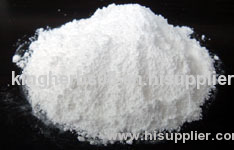
Chlorogenic Acid (CAS No.: 327-97-9 )
| Min. Order: | 1 Kilogram |
|---|---|
| Trade Term: | FOB |
| Payment Terms: | L/C, T/T |
| Supply Ability: | 500kgs |
| Place of Origin: | Hunan |
Company Profile
| Location: | Changsha, Hunan, China (Mainland) |
|---|---|
| Business Type: | Manufacturer |
| Main Products: | Plant Extract |
Product Detail
| Brand Name: | Kingherbs |
|---|---|
| Production Capacity: | 500kgs |
| Packing: | Packed in fiber drum, LDPE bag inside. Net weight: 25kgs/drum |
| Delivery Date: | within 3-5 working days |
Product Description
Plant Origin: Eucommia Ulmoides Oliv.
Part Used: Leaf
Specification: Chlorogenic Acid 98% By HPLC
CAS No.: 327-97-9
Molecular Formula: C16H18O9
Molecular Weight: 354.31
Melting Point: 207°C - 209 °C
Part Used: Leaf
Specification: Chlorogenic Acid 98% By HPLC
CAS No.: 327-97-9
Molecular Formula: C16H18O9
Molecular Weight: 354.31
Melting Point: 207°C - 209 °C
Functions:
Chlorogenic acid is the ester of caffeic acid with the 3-hydroxyl group of quinic acid. It is a major phenolic compound in coffee, isolated from the leaves and fruits of dicotyledonous plants. This compound, long known as an antioxidant, also slows the release of glucose into the bloodstream after a meal.
This acid is an important factor in plant metabolism. It is also an antioxidant and an inhibitor of the tumor promoting activity of phorbol esters; at concentrations as high as 100 µg/L, does not inhibit the 5-lipoxygenase activity of ionophore-stimulated human polymorphonuclear leukocytes. Chlorogenic acid and caffeic acid are antioxidants in vitro and might therefore contribute to the prevention of cardiovascular disease. This substance is claimed to have antiviral and antibacterial effects, and mints to promote weight reduction.
Chlorogenic acid has been proven in animal studies in vitro to inhibit the hydrolysis of the glucose-6-phosphate enzyme in an irreversible fashion. This mechanism allows chlorogenic acid to reduce hepatic glycogenolysis (transformation of glycogen into glucose) and to reduce the absorption of new glucose. In addition, in vivo studies on animal subjects have demonstrated that the administration of chlorogenic acid lessens the hyperglycemic peak resulting from the glycogenolysis brought about by the administering of glucagon, a hyperglycemiant hormone. The studies also confirmed a reduction in blood glucose levels and an increase in the intrahepatic concentrations of glucose-6-phosphate and of glycogen.


